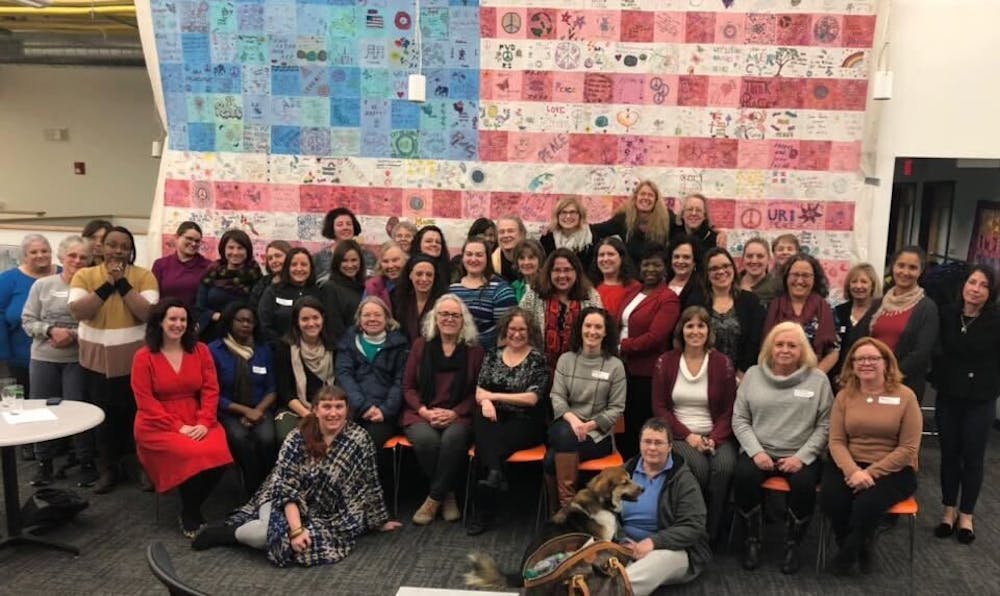In January, the Rhode Island Democratic Women’s Caucus — a breakaway Democratic group that controls its own fundraising and endorsements — elected a new slate of leaders. The Rev. Donnie Anderson was elected caucus chair and Cynthia Mendes, a former state senator who ran in the Democratic primary for lieutenant governor last year, was elected vice chair.
The Herald spoke to caucus members and leaders about the organization’s history, their path to the caucus and the organization’s priorities for the 2023 legislative session.
Creating political power for Rhode Island women
The caucus formed in 2019 as a response to a Rhode Island Democratic State Committee vote that prevented party caucuses from operating independently, the Boston Globe previously reported. By splitting, the caucus could “raise money and determine which candidates get that money,” Anderson said — ensuring that the candidates the caucus supports embody their values.
At the time of the separation, then-caucus Chair Liz Gledhill called the state party a “boys’ club,” according to the Globe.
Still, Anderson emphasized that the split does not signify being “against the Democratic Party.”
According to its website, the caucus is “committed to increasing the number of Democratic women elected to public office and appointed to public policy positions.” It also works to “civically engage women of all ages in the political process.”
The caucus focuses on leadership positions across the state including, but not limited to, government positions, Mendes said. The caucus is also focused on “growing membership and listening” to Democratic women’s priorities and needs and not just the “talking points that the party has given us.”
Additionally, the caucus encourages women to run for school committees. School leadership positions are especially important in the context of “the African American AP curriculum getting watered down because of political pressure,” Anderson noted.
Anderson combines politics, faith
In January, Anderson became the first transgender woman to be elected chair of the caucus, running unopposed. The caucus, she said, is another avenue to build upon her social justice work as the previous executive minister of the Rhode Island State Council of Churches. She also previously served as co-chair of the Rhode Island Commission on Prejudice and Bias and co-chair of the State Advisory Committee for the United States Commission on Civil Rights, the Providence Journal reported.
In the caucus, Anderson said she has always been “treated with respect and as a peer,” she said. “That really meant a lot to me. I don't get that acceptance everywhere, but I did there.”
As a practicing minister, Anderson said her faith informs her politics: “My faith journey and my political journey became parallel,” she noted.
Anderson understands the Gospels as lessons in “treat(ing) all people with dignity and respect,” she said, in addition to preventing the creation of “barriers between people, whether it’s related to ability, background, what college we went to or whether we went to college at all.”
This legislative session, a top priority for the caucus is passing the Equality in Abortion Coverage Act, which provides coverage for abortion procedures for individuals on Medicaid or state employee health insurance plans.
“A lot of people in the pro-life movement oversimplify the issue of abortion,” said Anderson, a practicing minister. “It’s a very nuanced issue … (and) requires wisdom and discernment and the implications are so great that only people who are affected by it should be able to make this decision.”
“There is a racist element to the denial of Medicaid coverage,” she said, which is “absolutely unjust and unfair.”
‘Use power differently’: Mendes looks to build solidarity
The women in the caucus largely influenced Mendes’s decision to run for vice chair of the caucus. She saw that the “caucus “had gone toe-to-toe with the (Democratic) party multiple times and always sided with women and marginalized people,” including during her own run for state senator when she struggled to find endorsements.
Mendes wanted to become more deeply involved in an organization made of “brave women (who are) willing to use power differently.”
Working as an elected official, Mendes noted that even “common-sense” legislation that would marginally improve lives was “met with every single barrier.”
Mendes emphasized the importance of strategically building solidarity and organizational capacity in her community — as opposed to attempting to impact powerful institutions on her own or “asking marginalized people to enter these positions of power and take on an entire institution.”
Finding community in the caucus
Executive committee member and social worker Diane Hill said she “felt at home right away” in the caucus and found sisterhood within its “multigenerational character”
Hill, a longtime climate advocate who works with Climate Action Rhode Island, was drawn to a caucus of women that understands “that we have a moral responsibility to future generations.”
Her work with the caucus intersects with a counseling practice serving women and girls that she runs and over 30 years of experience as a mental health counselor for students as they navigate social pressures.
Her decision to take on a leadership role came as a result of being inspired by the organization and its position as a “great contradiction to internalized sexism,” she said: In the group, women are “not competing with each other, but backing each other, supporting and nurturing each other.”
Correction: A previous version of this story misnamed Diane Hill. The Herald regrets this error.
Clarification: A previous version of this story misrepresented Diane Hill's counseling practice as a mentorship program.





